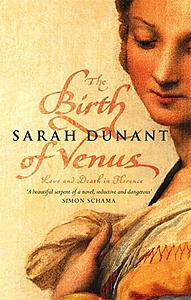Take a photo of a barcode or cover
adventurous
emotional
mysterious
tense
medium-paced
Plot or Character Driven:
Plot
Diverse cast of characters:
No
It is so gratifying to finish a book! This one was good... though, I am a huge fan of historical fiction (probably my favorite genre), this time-period is not my fav and I wasn't drawn in as much as I would have liked. It took me quite a while to get into the story and I had no problem putting it down, but the tale was interesting and I am now a bit more intrigued with 15th century Florence.
this novel has more scope and more twists and plot turns. Dunant has a great ear for the time and her knowledge of her subject matter is exemplary. The reader roots for Alessandra and in turn she is a careful and honest narrator. While "Artemisia" ends on a happy note, "Venus" ends with melancholy. It is a great story!
This book has become my favorite book. It is a great novel for any woman to read, and it leaves you with a sense that you can do anything.
Meh ~ The writing is solid - good language, good descriptions, good characters, good story. My issue is that I never really felt connected to the time or the characters or the events that were happening. While all the elements of a great novel were there, they never actually came together to create a great novel. So while this has been compared to The Girl with the Pearl Earring, I wouldn't actually go that far... Didn't love it; didn't hate it; meh.
very good read - historical fiction from a women's perspective (florence, art, love)
I listened to this on tape, and it was an abridgement, which I usually avoid, but this one worked. it was beautiful and exciting and I was excited to drive places!
Intensely slow moving, especially at the start, historical novel set in Florence in the 1500s. And yet I really enjoyed it and found it very evocative. Worth a look for the historical art buffs or if you want to read about women's lives at the time. These novels always remind me how cheap women's lives were at the time. Consider that our narrator, Alessandra, is almost 15 when she marries. And she's a well-to-do daughter of a merchant. It's all teenage lust and pregnancy, but at a time when it was the norm. Tragic when you think the risks of dying in childbirth, so many women would never have reached twenty. On the other hand the men get to learn, live and develop and wait until they are in their thirties before they marry.
This slow moving story is the life story of Alessandra, daughter of a merchant, with one sister and two brothers, who is living in Florence as the Renaissance is off and away - she is fascinated by art and a talent for it herself. But the French are threatening to occupy Florence, so for her safety she is married off early and swiftly to a guy who doesn't have a lot of interest in the ladies, but is using her as a cover. And after the French the city gets occupied by the religious zealots, led by a mad priest who kicks off witch hunts of the rich, the vain, the sodomites etc and plunges the city into a bit of a fearful, repressed state.
I'm undecided whether the birth of Venus refers to Alessandra's own renaissance, when she eventually ends in a situation where she can be herself and paint, or more literally to the birth of her own daughter, Plautilla. I remember her having a conversation with her husband and about the painting the birth of Venus and something about it being the meeting of the classical and the Christian. Could Alessandra with all her learning be the classical, with the painter with his monastry upbringing be the Christian?
This slow moving story is the life story of Alessandra, daughter of a merchant, with one sister and two brothers, who is living in Florence as the Renaissance is off and away - she is fascinated by art and a talent for it herself. But the French are threatening to occupy Florence, so for her safety she is married off early and swiftly to a guy who doesn't have a lot of interest in the ladies, but is using her as a cover. And after the French the city gets occupied by the religious zealots, led by a mad priest who kicks off witch hunts of the rich, the vain, the sodomites etc and plunges the city into a bit of a fearful, repressed state.
I'm undecided whether the birth of Venus refers to Alessandra's own renaissance, when she eventually ends in a situation where she can be herself and paint, or more literally to the birth of her own daughter, Plautilla. I remember her having a conversation with her husband and about the painting the birth of Venus and something about it being the meeting of the classical and the Christian. Could Alessandra with all her learning be the classical, with the painter with his monastry upbringing be the Christian?




